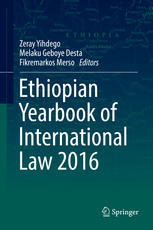

Most ebook files are in PDF format, so you can easily read them using various software such as Foxit Reader or directly on the Google Chrome browser.
Some ebook files are released by publishers in other formats such as .awz, .mobi, .epub, .fb2, etc. You may need to install specific software to read these formats on mobile/PC, such as Calibre.
Please read the tutorial at this link: https://ebookbell.com/faq
We offer FREE conversion to the popular formats you request; however, this may take some time. Therefore, right after payment, please email us, and we will try to provide the service as quickly as possible.
For some exceptional file formats or broken links (if any), please refrain from opening any disputes. Instead, email us first, and we will try to assist within a maximum of 6 hours.
EbookBell Team

4.8
14 reviewsThis first volume of EtYIL focuses on issues concerning the developing world in general and (the Horn of) Africa – and Ethiopia – specifically. It argues that rebalancing the international law narrative to reflect Africa’s legitimate interests is an urgent priority, and can only succeed through the fair representation of African countries in the creation and interpretation of international law.The book begins by reflecting on the ICJ’s West African Cases and provides a unique perspective on decolonisation as a source of jus cogens and obligations erga omnes. This is followed by a comprehensive analysis of the reception of international law in the Ethiopian legal system, and of the potential implications of Ethiopia joining the WTO. The book then delves into such topical issues as the relationship between competition for natural resources and international investment law, the UN Global Goals and the fledgling international climate change regime, with particular emphasis on the Paris Climate Agreement and their implications for developing countries. Further issues include the Declaration of Principles on the Grand Ethiopian Renaissance Dam signed by Ethiopia, Sudan and Egypt in light of Nile colonial treaties and contemporary international watercourses law, as well as selected legal implications of the armed conflict in South Sudan. Gathering high-quality scholarship from diverse researchers, and examining a constellation of critical international law issues affecting developing countries, especially African countries, the book offers a unique resource.